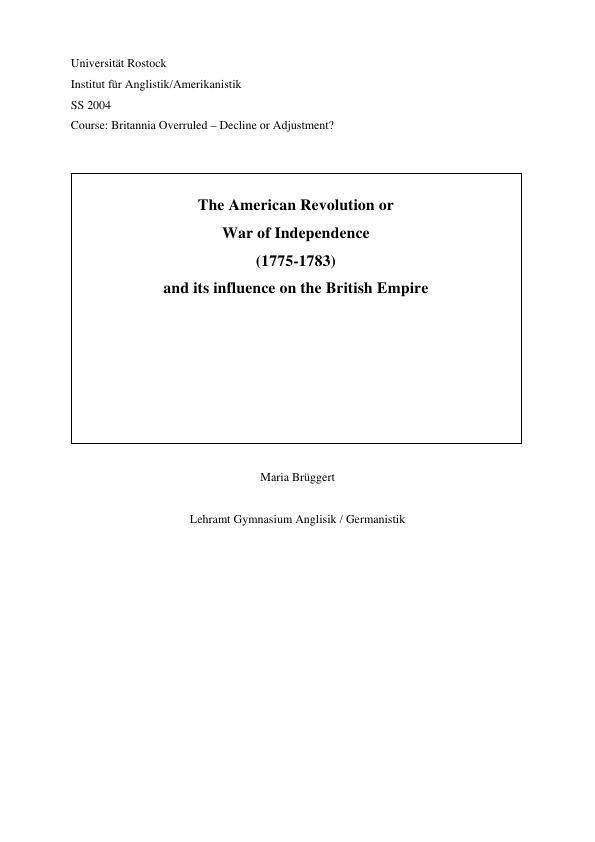1 Introduction
When we consider a definition of war, we will find: “War is an armed conflict between countries or groups that involves killing and destruction.” Whether offensive or defensive, war is an organized conflict of power where political, industrial, ideological and military interests are pushed through. Pursuing such aims always involves an infringement in peoples´ safe living together, their stability and protection. History shows that wars have been held throughout mankind´s existence. A German quotation emphasises the above-mentioned thoughts: “Der Klang, der am nachhaltigsten durch die Geschichte der Menschheit hallt, ist der von Kriegstrommeln.”
The American War of Independence is a historical example which shows two sides of war – you can loose or win it. On the one hand the revolution caused a loss of lives but on the other hand they rescued the basis for the formation of the United States of America. The British Empire lost 13 colonies, America won its independence.
Faced with all these impressions I will demonstrate how British colonies arose in North America and why they started revolting against Britain’s control. How could America win its independence? Which constitution did the United States of America get after the war? While analyzing the topic I will miss the course of the war. This paper concentrates on the questions why it happened and how it ended. I make use of secondary sources and pictures to prove, support und intensify my statement.
2 British Colonies in North America
English colonization along the Atlantic Coast started in the 17th century. Across the Atlantic came Englishmen, Frenchmen, Germans, Scots, Irishmen, Dutchmen, Swedes, and many others who attempted to transplant their habits and traditions to the new world. They left their native countries to find a better life.
Travellers to North America came in small overcrowded ships. During their six- to twelve-week voyage, they subsisted on meagre rations. Many of the ships were lost in storms, many passengers died of disease, and infants rarely survived the journey. There was the danger to die but they came the long way in crowds – why? The most important motive which induced emigrants to leave their European homelands was the desire for greater economic opportunity. This urge was frequently reinforced by other significant considerations such as religious freedom, escape from political oppression or the lure of adventure.
Inhaltsverzeichnis (Table of Contents)
- Introduction
- British Colonies in North America
- War of Independence
- Why did the colonies revolt?
- Who wrote the Declaration of Independence?
- How could the colonies win the war?
- Which kind of constitution did the colonies get after they had won the war of independence?
- Results of the revolutionary war
- Conclusion
Zielsetzung und Themenschwerpunkte (Objectives and Key Themes)
This paper aims to explain the emergence of British colonies in North America, the causes of their rebellion against British control, and the resulting American War of Independence. It explores how the colonies gained their independence, the type of constitution established, and the consequences of the war for both sides.
- British colonization of North America
- Causes of the American Revolution
- The American War of Independence
- Formation of the United States of America
- Impact of the war on the British Empire
Zusammenfassung der Kapitel (Chapter Summaries)
- Introduction: This chapter introduces the concept of war and its historical significance, highlighting the American War of Independence as a prime example. It briefly outlines the paper's focus, which is to analyze the causes and consequences of the war, rather than the details of the fighting.
- British Colonies in North America: This chapter explores the origins and development of British colonies in North America, from the 17th century onwards. It discusses the motivations of the colonists, including the search for economic opportunity, religious freedom, and escape from political oppression. The chapter also examines the limited control exercised by the British government over the colonies and the gradual growth of colonial autonomy.
- War of Independence: This chapter delves into the reasons behind the American Revolution. It identifies the British government's misjudgments and its attempts to restrict colonial freedoms as key triggers for the conflict. The chapter also explores the role of taxation without representation, trade restrictions, and the Boston Tea Party in fueling colonial resentment.
Schlüsselwörter (Keywords)
This text focuses on the key terms and concepts related to the American War of Independence, including British colonization, colonial autonomy, taxation without representation, the Boston Tea Party, the Declaration of Independence, and the impact of the war on the British Empire.
Frequently Asked Questions
What are the main reasons for the American colonies' revolt?
Key triggers included "taxation without representation," trade restrictions, British government misjudgments, and events like the Boston Tea Party.
When did the American War of Independence take place?
The war lasted from 1775 to 1783.
What were the primary motives for emigrating to North America in the 17th century?
Motives included the desire for economic opportunity, religious freedom, escape from political oppression, and adventure.
What was the impact of the war on the British Empire?
The British Empire lost 13 of its North American colonies, while the United States of America was formed as an independent nation.
Does the paper focus on military battles?
No, the paper concentrates specifically on the causes of the war and its political/constitutional outcomes rather than the course of the fighting.
- Quote paper
- Maria Brüggert (Author), 2004, The American Revolution or War of Independence (1775-1783) and its influence on the British Empire, Munich, GRIN Verlag, https://www.grin.com/document/89039



